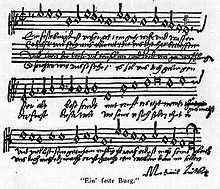A Mighty Fortress is Our God
| "Ein feste Burg ist unser Gott" | |
|---|---|
| Hymn by Martin Luther | |

"Ein feste Burg" with Luther's signature
|
|
| Written | c. 1529 |
| Text | by Martin Luther |
| Language | German |
| Based on | Psalm 46 |
| Melody | "Ein feste Burg" by Martin Luther |
| Published | c. 1531 (extant) |
| "A Mighty Fortress Is Our God" | |
|---|---|
| Written | 1853 |
| Text | by Frederick H. Hedge (translator) |
"A Mighty Fortress Is Our God" (German: "Ein feste Burg ist unser Gott") is one of the best known hymns by the reformer Martin Luther, a prolific hymnodist. Luther wrote the words and composed the melody sometime between 1527 and 1529. It has been translated into English at least seventy times and also into many other languages. The words are a paraphrase of Psalm 46.
"A Mighty Fortress" is one of the best loved hymns of the Lutheran tradition and among Protestants more generally. It has been called the "Battle Hymn of the Reformation" for the effect it had in increasing the support for the Reformers' cause. John Julian records four theories of its origin:
Alternatively, John M. Merriman writes that the hymn "began as a martial song to inspire soldiers against the Ottoman forces" during the Ottoman wars in Europe.
The earliest extant hymnal in which it appears is that of Andrew Rauscher (1531), but it is supposed to have been in Joseph Klug's Wittenberg hymnal of 1529, of which no copy exists. Its title was Der xxxxvi. Psalm. Deus noster refugium et virtus. Before that it is supposed to have appeared in the Hans Weiss Wittenberg hymnal of 1528, also lost. This evidence would support its being written in 1527–1529, since Luther's hymns were printed shortly after they were written.
The song was used like an anthem by Sweden during the Thirty Years' War.
Ein feste Burg ist unser Gott,
ein gute Wehr und Waffen.
Er hilft uns frei aus aller Not,
die uns jetzt hat betroffen.
Der alt böse Feind
mit Ernst er’s jetzt meint,
groß Macht und viel List
sein grausam Rüstung ist,
auf Erd ist nicht seinsgleichen.
Mit unsrer Macht ist nichts getan,
wir sind gar bald verloren;
es streit’ für uns der rechte Mann,
den Gott hat selbst erkoren.
Fragst du, wer der ist?
Er heißt Jesus Christ,
der Herr Zebaoth,
und ist kein andrer Gott,
das Feld muss er behalten.
Und wenn die Welt voll Teufel wär
und wollt uns gar verschlingen,
so fürchten wir uns nicht so sehr,
es soll uns doch gelingen.
Der Fürst dieser Welt,
wie sau’r er sich stellt,
tut er uns doch nicht;
das macht, er ist gericht’:
ein Wörtlein kann ihn fällen.
Das Wort sie sollen lassen stahn
und kein’ Dank dazu haben;
er ist bei uns wohl auf dem Plan
mit seinem Geist und Gaben.
Nehmen sie den Leib,
Gut, Ehr, Kind und Weib:
lass fahren dahin,
sie haben’s kein’ Gewinn,
das Reich muss uns doch bleiben.
...
Wikipedia
